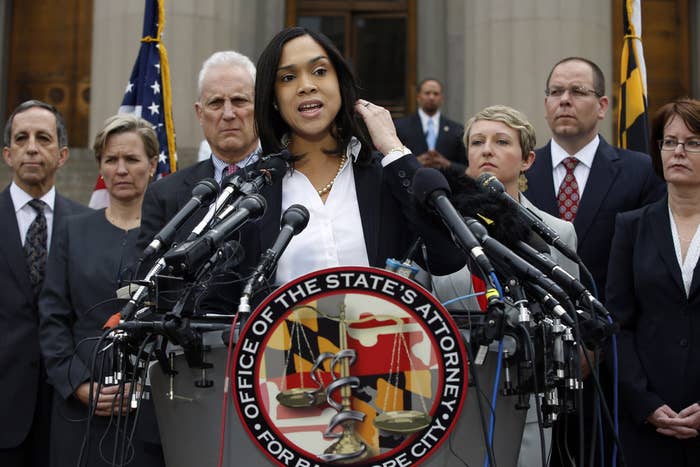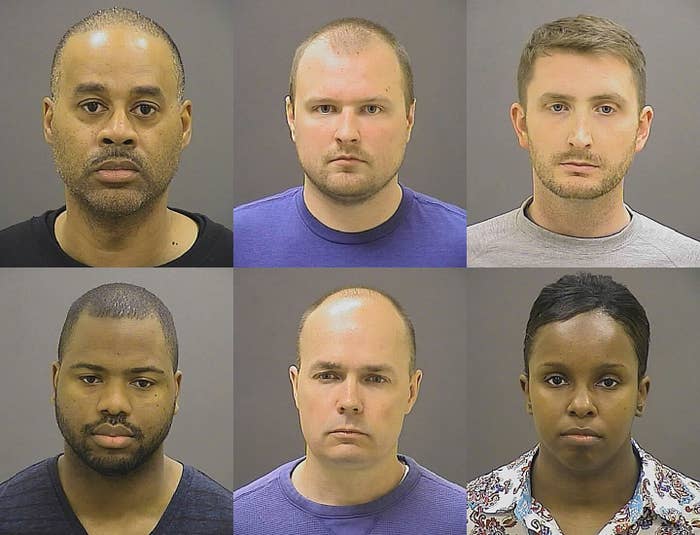On Friday, Baltimore's top prosecutor charged six police officers in relation to the death of Freddie Gray. Here's what you need to know about each of those charges.

1. "Depraved heart" murder in the second degree
This felony is the most serious charge in the case and carries a potential penalty of 30 years in prison. Only one of the officers — Caesar Goodson, who is 46 years old and black — has been accused of this offense.
In Maryland, a person is guilty of second-degree murder when they do something malicious that results in the death of a person, even if the intention of the action wasn't to kill the person who died. It is an intermediate offense between first-degree murder (which implies intention to kill and, crucially, premeditation) and manslaughter (which implies no ill intention, but only recklessness).
In order to convict someone of second-degree murder, the prosecutor has to show that the defendant had malicious intent. There are several ways to do that, one of which is to show that the defendant acted with a "depraved heart." In a 1986 opinion for Robinson v. State, Judge Sally Adkins of the Maryland Court of Appeals defined the term as follows:
Depraved heart murder is the form of murder that establishes that the willful doing of a dangerous and reckless act with wanton indifference to the consequences and perils involved, is just as blameworthy, and just as worthy of punishment, when the harmful result ensues, as is the express intent to kill itself. This highly blameworthy state of mind is not one of mere negligence. It is not merely one even of gross criminal negligence. It involves rather the deliberate perpetration of a knowingly dangerous act with reckless and wanton unconcern and indifference as to whether anyone is harmed or not. The common law treats such a state of mind as just as blameworthy, just as anti-social and, therefore, just as truly murderous as the specific intents to kill and to harm.
Other circumstances in which a person could be charged with depraved heart murder include when parents let a child starve to death and when gang members shoot at each other in a crowded street and end up killing a bystander.
2. Manslaughter by vehicle
Officer Goodson has also been charged with two counts of vehicular manslaughter. One of those counts is a felony that alleges he acted with gross negligence and carries a potential penalty of 10 years in prison. The other count is a misdemeanor that alleges he was criminally negligent, which could send him to prison for three years.
In Maryland, a person is guilty of manslaughter when they do something reckless or negligent that results in another person's death — even if that action did not intend to harm the person who died. Vehicular manslaughter occurs when the reckless action that resulted in death involved a car.
The two charges levied against Goodson have different penalties because they imply different levels of awareness of risk. The cop will only be convicted of gross negligence if the prosecutor can show that he was "conscious of the risk to human life that his or her behavior created, but acted with disregard for the human life," according to FindLaw.
By contrast, Goodson could be convicted of the lesser criminal negligence charge if the prosecutor can show that he should have known better.
3. Involuntary manslaughter
Officer William Porter (who is black and 26 years old), Lieutenant Brian Rice (who is white and 42), and Sergeant Alicia White (who is black and 31) all face this felony charge, which carries a potential penalty of 10 years in prison.
The charge is similar to grossly negligent vehicular manslaughter, but carries a smaller fine ($500 rather than $5,000) because the action that resulted in the death of a person did not involve a car.

4. Assault in the second degree
Lt. Rice, Sgt. Miller, and officers Goodson, Porter, Edward Nero (who is white and 29), and Garret Miller (who is white and 26) all face this misdemeanor charge.
In Maryland, a person is guilty of assault when they offensively touch someone else without that person's consent, or do something that makes that person afraid that they will be touched without their consent, according to local attorney Christopher Peretti.
First-degree assault implies that the accused person caused or attempted to cause "serious physical injury" to another person. Second-degree assault — which is what the Baltimore cops are being charged with — is a less severe charge and only implies "offensive physical contact."
5. Misconduct in office
All six officers are being charged with this common-law misdemeanor, which is defined in case law as "corrupt behavior by an officer in the exercise of the duties
of his or her office or while acting under color of office," according to the Maryland Municipal League.
This offense is not defined in Maryland's statutes, so there is no set penalty. That means judges can decide how to best punish people who are found guilty of this charge — so long as the punishment they choose does not violate the Eighth Amendment by being cruel or unusual.
6. False imprisonment
Rice, Nero, and White also face this common-law misdemeanor, which like misconduct in office is not defined by Maryland statues and carries a penalty left to the discretion of the judge.
False imprisonment is defined as "the unlawful confinement of a person" and results from "any unlawful exercise or show of force by which a person is compelled to remain where he does not wish to remain or go where he does not wish to go," according to Justia.
The allegation behind this charge is that the officers who arrested Gray did so illegally. According to the prosecutor, they shouldn't have detained him in the first place.
